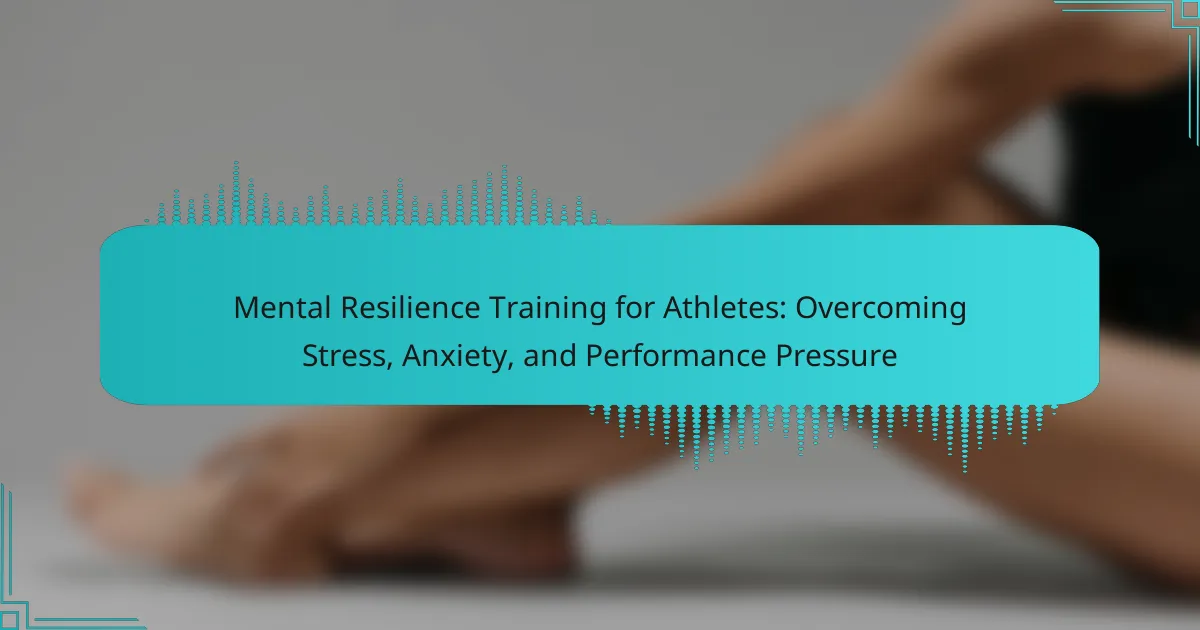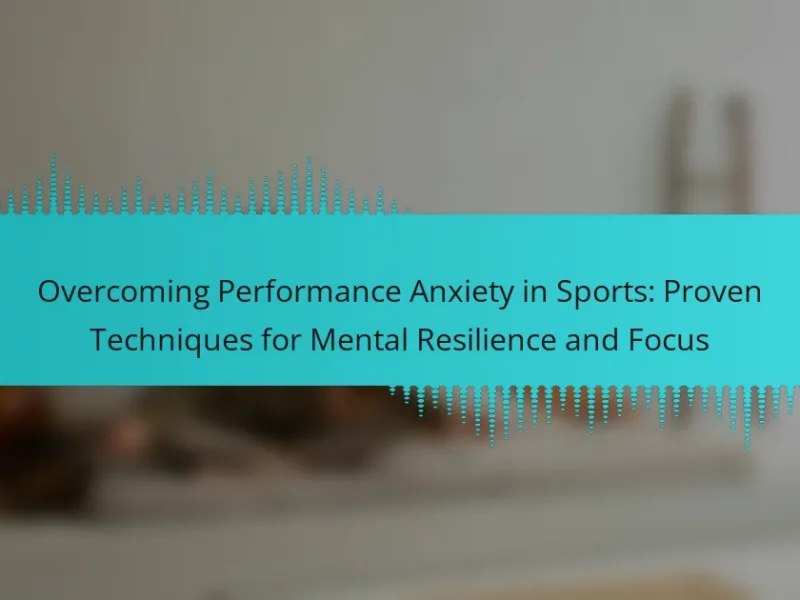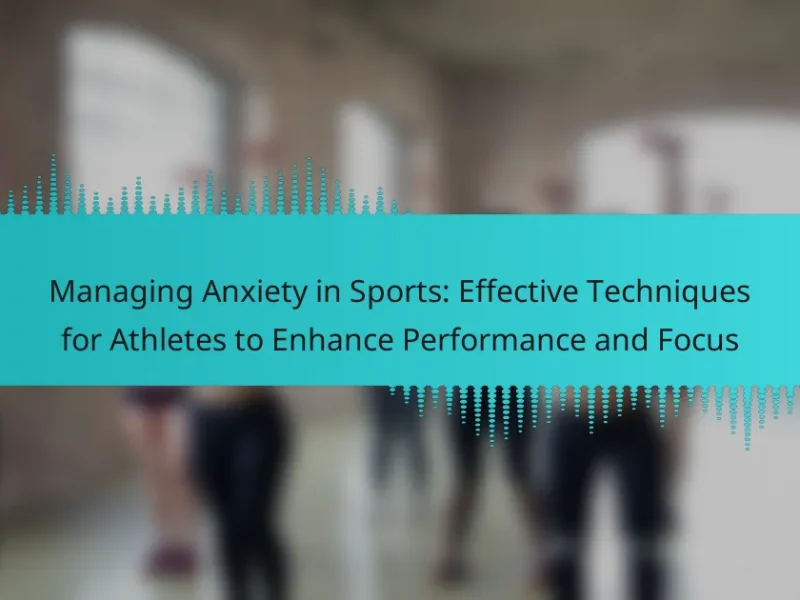Mental resilience training for athletes enhances their ability to cope with stress, anxiety, and performance pressure. This article explores key techniques like mindfulness, visualization, and goal-setting that improve focus and emotional regulation. It also addresses common mistakes athletes make in managing stress and highlights the importance of structured training for long-term resilience. Regular practice of these methods can significantly enhance performance consistency and overall well-being.

What is Mental Resilience Training for Athletes?
Mental resilience training for athletes is a structured approach that enhances their ability to cope with stress, anxiety, and performance pressure. This training focuses on developing mental skills such as focus, confidence, and emotional regulation. Athletes learn techniques like visualization, self-talk, and mindfulness, which help them manage their thoughts and emotions during competition. As a result, mental resilience training significantly improves performance consistency and overall well-being. Research indicates that athletes who engage in this training experience reduced anxiety levels and enhanced focus during high-pressure situations.
How does mental resilience impact athletic performance?
Mental resilience significantly enhances athletic performance by enabling athletes to manage stress and pressure effectively. This training fosters a positive mindset, which is crucial during high-stakes competitions. Athletes with strong mental resilience exhibit improved focus, better decision-making, and increased confidence, leading to more consistent performances. Research shows that athletes who engage in mental resilience training report lower levels of anxiety and higher satisfaction with their performance outcomes.
What are the key components of mental resilience training?
Mental resilience training for athletes includes several key components that enhance their ability to manage stress and performance pressure. These components are mental skills development, emotional regulation, goal setting, and visualization techniques.
Mental skills development focuses on building concentration and focus, essential for optimal performance. Emotional regulation teaches athletes to control their emotional responses, reducing anxiety and stress. Goal setting provides clear objectives, fostering motivation and a sense of achievement. Visualization techniques help athletes mentally rehearse their performance, improving confidence and reducing performance-related anxiety.
These components collectively contribute to stronger mental resilience, enabling athletes to perform under pressure.
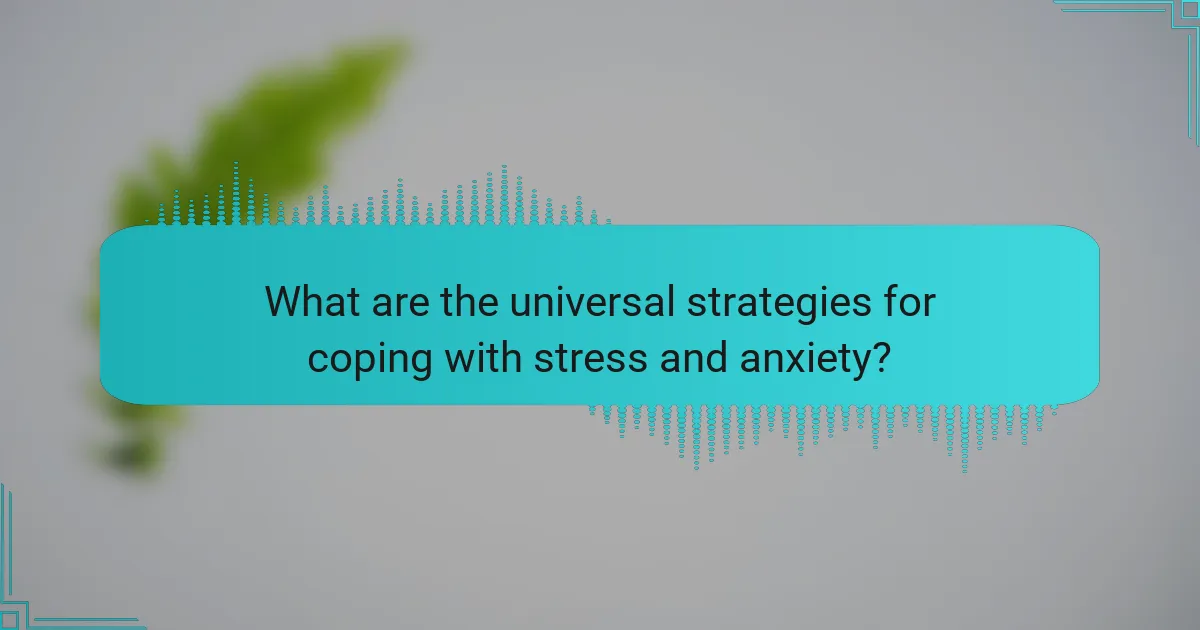
What are the universal strategies for coping with stress and anxiety?
Mental resilience training equips athletes with strategies to effectively cope with stress and anxiety. Key approaches include mindfulness techniques, visualization, goal-setting, and cognitive restructuring. Mindfulness enhances focus, while visualization prepares athletes mentally for performance. Goal-setting provides clarity and direction, and cognitive restructuring helps reframe negative thoughts. These strategies foster mental toughness, enabling athletes to manage performance pressure effectively.
How can breathing techniques help athletes manage anxiety?
Breathing techniques can significantly help athletes manage anxiety by promoting relaxation and focus. These techniques enhance mental resilience, enabling athletes to control their physiological responses to stress. Controlled breathing reduces heart rate and lowers cortisol levels, which are crucial during high-pressure situations. Additionally, deep breathing exercises can shift attention away from anxiety-inducing thoughts, fostering a calm mindset. Regular practice can lead to improved performance and a greater sense of control, ultimately enhancing an athlete’s ability to cope with competition-related stress.
What role does visualization play in reducing performance pressure?
Visualization significantly reduces performance pressure by enhancing mental resilience in athletes. It allows athletes to mentally rehearse their performance, leading to increased confidence and reduced anxiety. By creating vivid mental images of success, athletes can better manage stress and focus on their goals. Research indicates that visualization techniques can improve overall performance by up to 20%, illustrating its effectiveness in high-pressure situations.
How can goal setting enhance mental resilience?
Goal setting enhances mental resilience by providing clear objectives, fostering motivation, and enabling athletes to navigate stress effectively. It helps athletes focus on achievable milestones, thus reducing anxiety and performance pressure. Regularly setting and reviewing goals cultivates a growth mindset, reinforcing the ability to adapt and overcome challenges. Studies show that athletes who engage in structured goal setting exhibit improved performance and greater emotional control during competitions.

What unique methods can athletes use to build mental toughness?
Athletes can build mental toughness through unique methods like visualization, mindfulness, and goal-setting. Visualization involves mentally rehearsing performance scenarios to enhance confidence. Mindfulness practices, such as meditation, reduce anxiety and improve focus. Goal-setting provides clear objectives, fostering resilience through incremental achievements. Each method cultivates a robust mental framework essential for overcoming stress and performance pressure.
How does cognitive restructuring improve stress management?
Cognitive restructuring enhances stress management by altering negative thought patterns. This technique helps athletes identify and challenge irrational beliefs, leading to improved mental resilience. As a result, athletes experience reduced anxiety and increased focus during performance. Studies show that cognitive restructuring can significantly lower perceived stress levels, fostering a more positive mindset. By integrating this method into mental resilience training, athletes can better cope with performance pressure and maintain optimal mental health.
What is the significance of self-talk in overcoming anxiety?
Self-talk is crucial for athletes in overcoming anxiety, as it fosters mental resilience. Positive self-talk can reframe negative thoughts, enhancing focus and confidence during high-pressure situations. Research indicates that athletes who engage in constructive self-talk experience reduced anxiety levels and improved performance outcomes. This technique serves as a unique attribute in mental resilience training, providing a practical strategy for managing stress effectively. By consciously altering internal dialogue, athletes can cultivate a supportive mental environment that promotes peak performance.
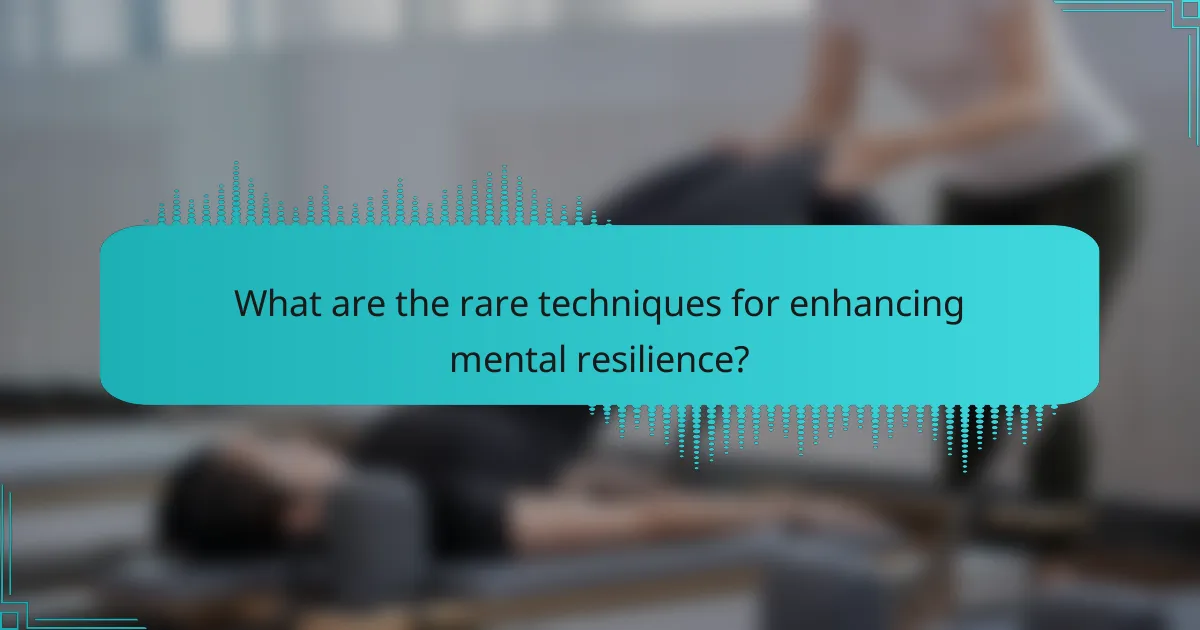
What are the rare techniques for enhancing mental resilience?
Rare techniques for enhancing mental resilience include visualization, mindfulness meditation, and cognitive restructuring. These methods help athletes manage stress and anxiety effectively. Visualization involves mentally rehearsing performance scenarios to build confidence. Mindfulness meditation fosters present-moment awareness, reducing negative thoughts. Cognitive restructuring challenges unhelpful beliefs, promoting a positive mindset. Implementing these techniques can significantly improve an athlete’s ability to cope with performance pressure.
How can athletes benefit from neurofeedback training?
Athletes can significantly enhance their mental resilience through neurofeedback training. This technique helps them manage stress, anxiety, and performance pressure by promoting self-regulation of brain activity. As a result, athletes experience improved focus and emotional control, leading to better performance outcomes. Neurofeedback training provides measurable benefits, such as increased concentration levels and reduced anxiety symptoms, which are crucial for competitive settings. Studies show that athletes who engage in neurofeedback report enhanced mental clarity and reduced performance-related stress, making it a valuable tool for peak performance.
What is the impact of mindfulness-based stress reduction on performance?
Mindfulness-based stress reduction significantly enhances performance by improving focus and reducing anxiety. Athletes practicing mindfulness report increased mental clarity and resilience, enabling them to cope better with performance pressure. Research indicates that these techniques can lead to measurable improvements in competitive outcomes, as athletes experience lower stress levels and enhanced emotional regulation. This approach fosters a unique attribute of sustained concentration, vital for peak performance in high-pressure situations.
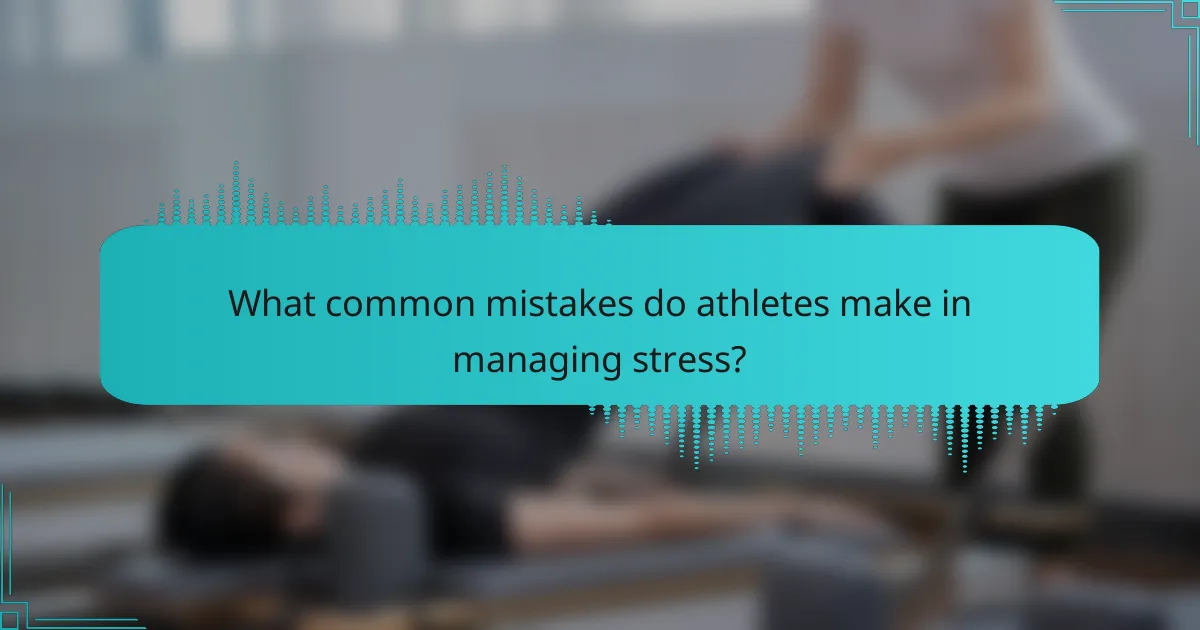
What common mistakes do athletes make in managing stress?
Athletes often make several common mistakes in managing stress. They may neglect mental preparation, focusing solely on physical training. Many fail to recognize the importance of rest and recovery, leading to burnout. Additionally, athletes might avoid seeking help for anxiety, believing it shows weakness. Poor time management can exacerbate stress, as can setting unrealistic performance expectations. Lastly, overlooking nutrition and hydration can negatively impact mental resilience.
How can overtraining contribute to increased anxiety levels?
Overtraining can significantly increase anxiety levels due to physical and mental fatigue. The body experiences heightened stress responses, leading to irritability and mood disturbances. Research indicates that overtraining alters hormonal balance, particularly increasing cortisol levels, which is linked to anxiety. Additionally, the lack of recovery can impair mental resilience, making athletes more susceptible to stress and anxiety. Addressing overtraining through proper rest and mental resilience training can mitigate these effects and enhance overall performance.
Why is it important to recognize signs of burnout?
Recognizing signs of burnout is crucial for maintaining mental resilience in athletes. Early identification allows for timely interventions that can prevent performance decline and mental health issues. Burnout can lead to chronic stress, anxiety, and reduced motivation, negatively impacting training and competition outcomes. Addressing these signs fosters a healthier mindset, enhancing overall athletic performance and well-being.
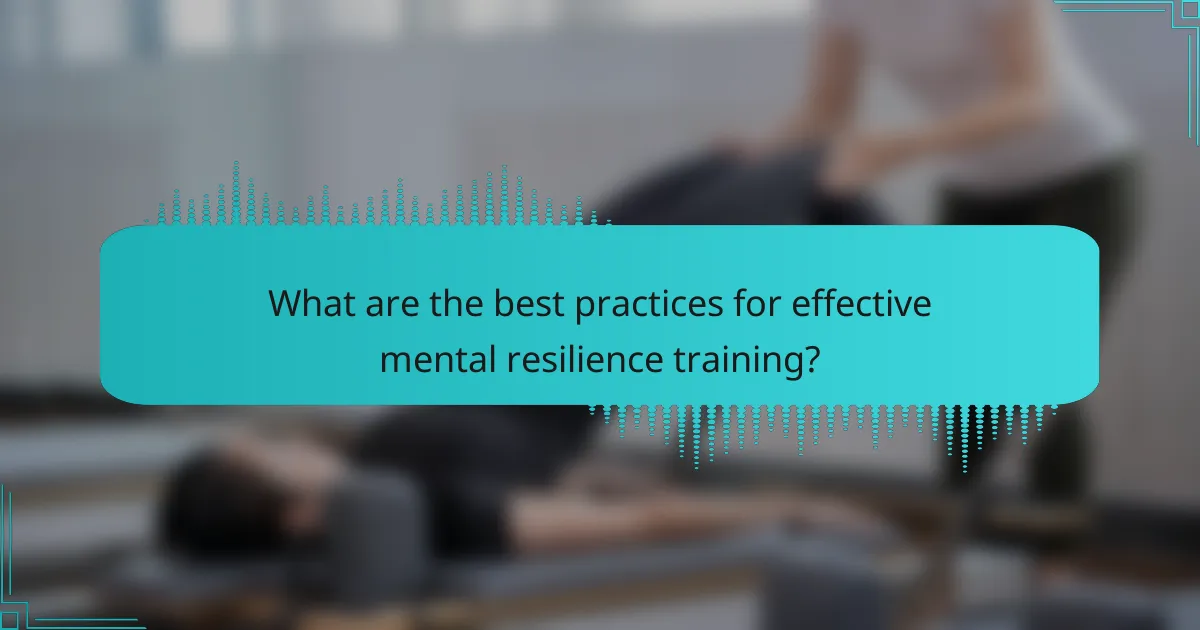
What are the best practices for effective mental resilience training?
Effective mental resilience training for athletes includes structured techniques that enhance coping strategies, focus, and emotional regulation. Key practices involve mindfulness training, visualization techniques, and goal-setting exercises.
Mindfulness training helps athletes maintain present-moment awareness, reducing anxiety and improving concentration. Visualization techniques allow athletes to mentally rehearse performances, enhancing confidence and reducing stress. Goal-setting exercises provide clear objectives, fostering motivation and a sense of achievement.
Regular practice of these techniques is essential for developing long-term resilience. Incorporating feedback mechanisms can also help athletes refine their strategies and adapt to performance pressures.
How can athletes create a personalized mental training plan?
Athletes can create a personalized mental training plan by identifying specific stressors and setting clear goals. Begin with self-assessment to understand individual mental resilience needs. Incorporate techniques such as visualization, mindfulness, and cognitive restructuring to enhance focus and reduce anxiety. Regularly evaluate progress and adjust the plan based on performance outcomes and emotional responses.
What resources are available for athletes seeking mental resilience support?
Athletes seeking mental resilience support can access various resources. These include mental health professionals specializing in sports psychology, online training programs, workshops, and mobile applications focused on mindfulness and stress management. Additionally, peer support groups and community forums provide platforms for sharing experiences and strategies. Many sports organizations also offer tailored mental resilience programs to help athletes cope with performance pressure and anxiety.
What expert insights can enhance mental resilience training?
Expert insights can significantly enhance mental resilience training for athletes by incorporating tailored strategies. Techniques like visualization, where athletes mentally rehearse performance scenarios, can reduce anxiety and improve focus. Additionally, mindfulness practices cultivate present-moment awareness, helping athletes manage stress effectively. Research indicates that resilience training can lead to a 25% improvement in performance under pressure. Furthermore, incorporating peer support systems encourages athletes to share experiences, fostering a sense of community and shared resilience. These insights provide a multifaceted approach to developing mental toughness in athletes.
